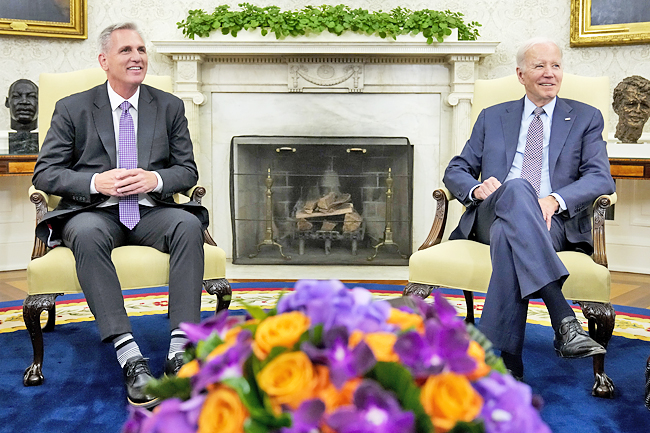WASHINGTON (AP) – United States (US) President Joe Biden and House Speaker Kevin McCarthy both said they had a productive debt ceiling discussion late on Monday at the White House, but there was no agreement as negotiators strained to raise the nation’s borrowing limit in time to avert a potentially chaotic federal default.
It’s a crucial moment for the Democratic president and the Republican Speaker, just 10 days before a looming deadline to raise the debt limit.
As soon as June 1, Treasury Secretary Janel Yellen said in a letter to Congress, “it is highly likely” the government will be unable to pay all the nation’s bills. Such an unprecedented default would be financially damaging for many Americans and others around the world relying on US stability, sending shockwaves through the global economy.
Each side praised the other’s seriousness, but basic differences remained. They are at odds over how to trim annual budget deficits.
Republicans are determined to cut spending while Biden’s team offered to hold spending levels flat. Biden wants to increase some taxes on the wealthiest Americans and some big companies, but McCarthy said early on that that is out of the question.

“The time of spending, just spending more money in America and government is wrong,” McCarthy said after the Oval Office meeting.
In a brief post-meeting statement, Biden called the session productive but merely added that he, McCarthy and their lead negotiators “will continue to discuss the path forward.” Upbeat, McCarthy said their teams would work “through the night”.
Biden said all agreed that “default is not really on the table.”
Though there is no agreement on basic issues, the contours of a deal seem within reach.
A budget deal would unlock a separate vote to lift the debt ceiling, now USD31 trillion, to allow more borrowing. Negotiations are focussed on finding compromise over a 2024 budget year cap that would be key to resolving the standoff. Republicans insisted next year’s spending be less than it is now, but the White House instead offered to hold spending flat at current 2023 numbers.
Republicans initially sought to roll back next year’s spending to 2022 levels, and impose one per cent caps on spending growth for 10 years, though a later proposal narrowed that to about six years.
The White House wants a two-year budget deal, keeping 2024 spending flat.


